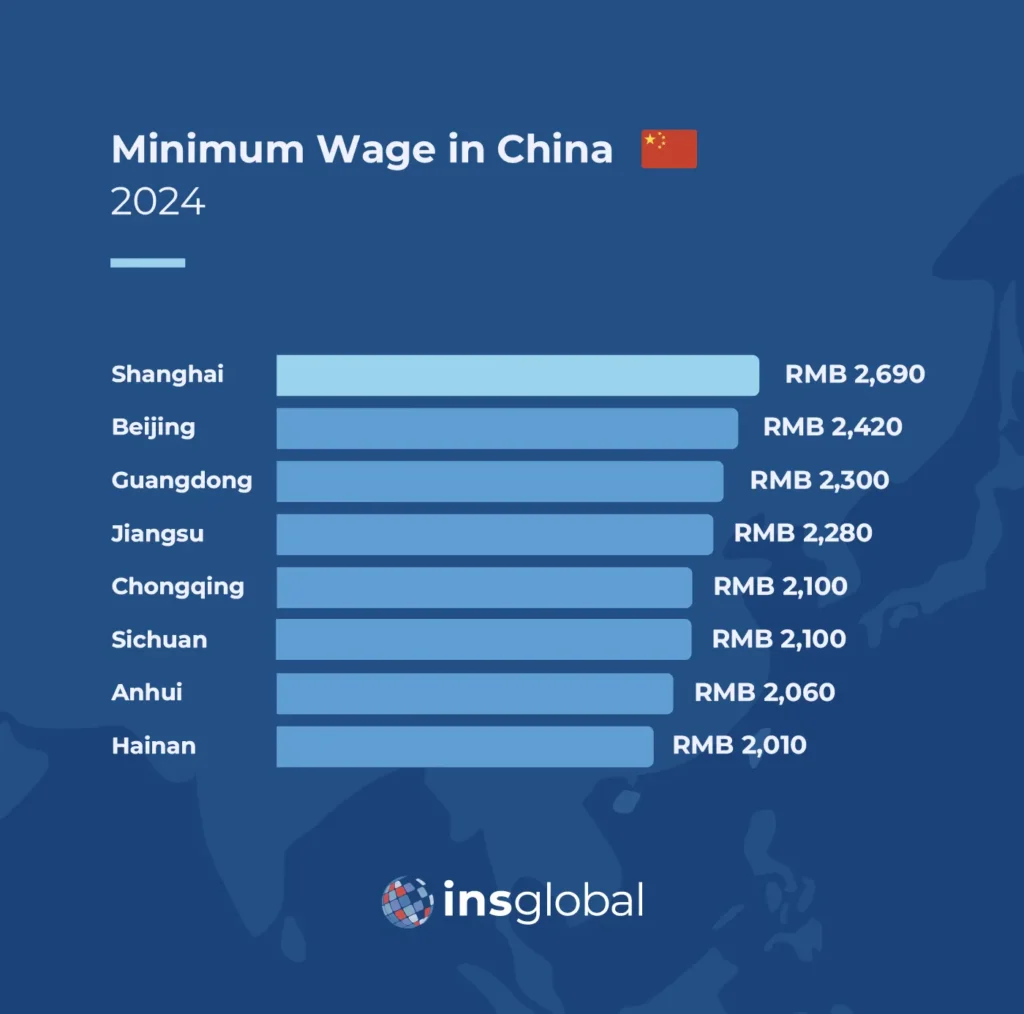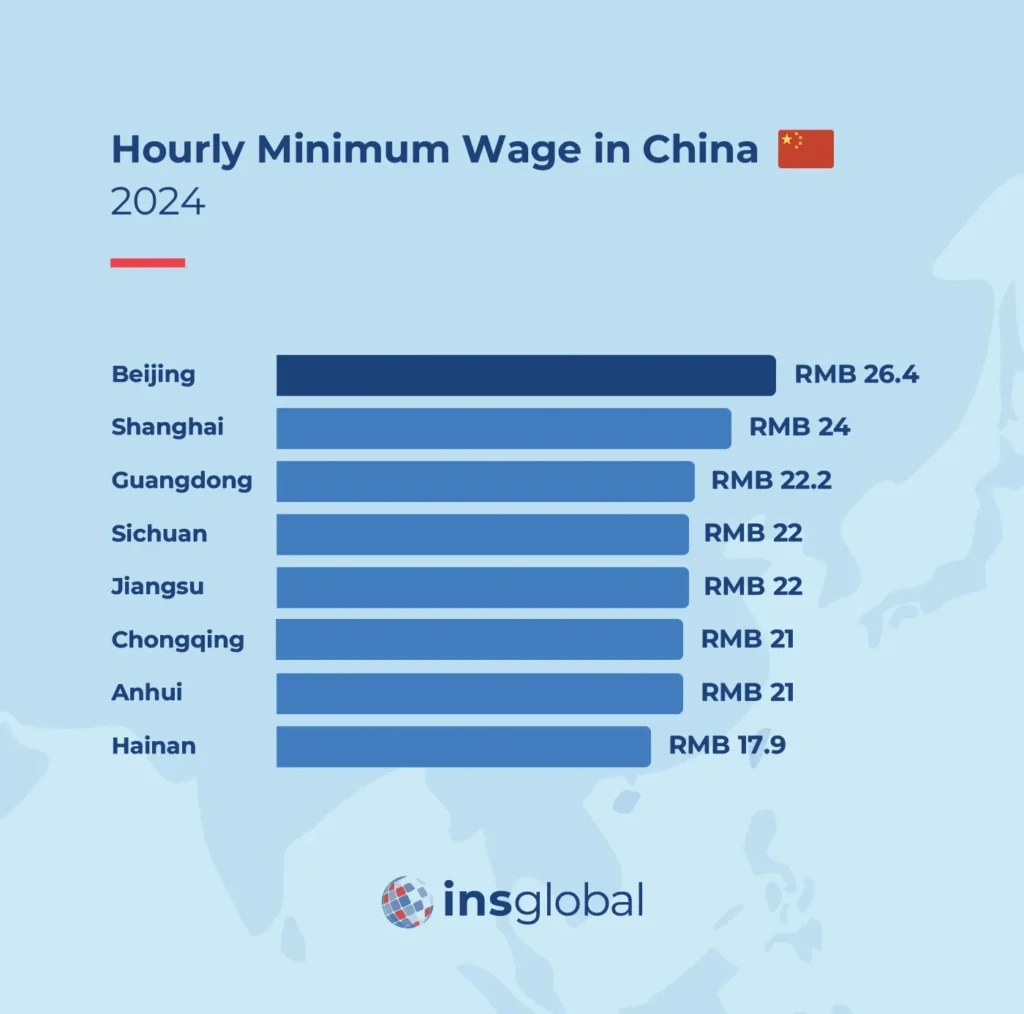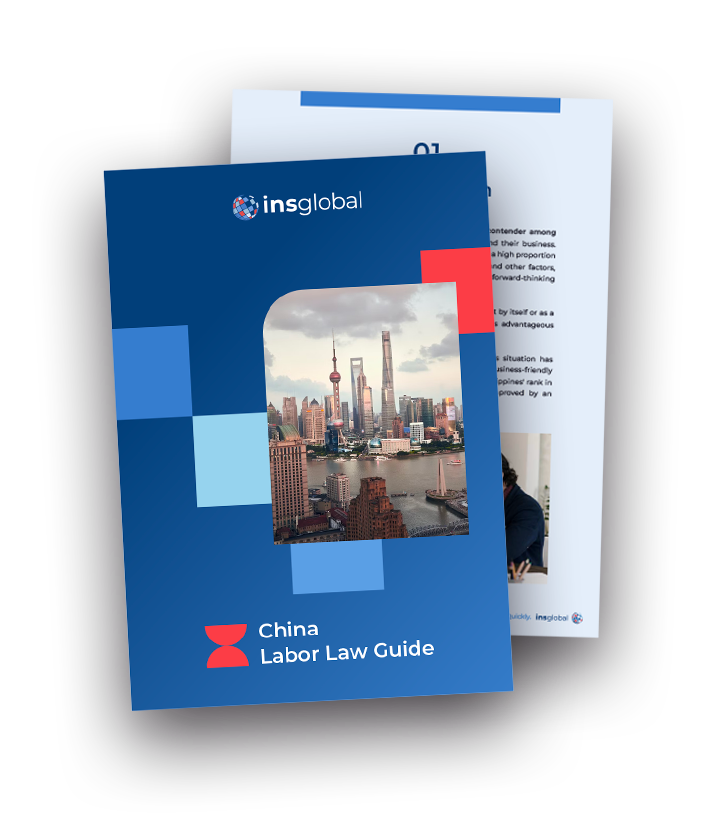Understanding salary standards in a new market is essential to many facets of a successful start and effective long-term strategies when expanding overseas. Understanding the minimum wage in China and how it affects future pay expectations for employees can make a big difference in job performance, long-term retention, and employee satisfaction.
Foreign companies in China remain at risk of intense scrutiny from the government, so failure to provide employees with their minimum worker benefits, including a correct minimum wage, typically results in serious penalties. Working with an Employer of Record in China helps businesses stay compliant while managing local payroll and labor laws efficiently.
In 2023, the news has been full of stories of companies in China, both local and foreign, being fined millions of dollars or penalized for improper workplace practices. However, knowing the law in these cases is just half the battle. That’s why INS Global offers all the support you need to understand local best practices and benchmarks in China.

Tired of scrolling? Download a PDF version for easier offline reading and sharing with coworkers
How the Minimum Wage Functions in China
In China, minimum wage levels are set at the provincial, autonomous area, and municipal levels rather than through a single national minimum wage.
Based on variables including the local cost of living, the state of the economy, and other considerations, each region determines its own minimum wage(s).
Determining the Minimum Wage in China
Periodic modifications to minimum wage rates may be made annually or less frequently in some cases, with the majority of provinces having updated their rates in 2023.
When deciding whether to raise the minimum wage, local governments frequently consider the state of the economy, inflation, and the average salary level in the area.

What is the Minimum Wage in China in 2023 and 2024?
In 2023, the minimum wage in China is set as follows in chosen major cities or provincial areas:
| Province/Region | Monthly minimum wage (RMB) | Hourly minimum wage (RMB) |
| Anhui | 2,060 | 21 |
| Beijing | 2,420 | 26.4 |
| Chongqing | 2,100 | 21 |
| Guangdong | 2,300 | 22.2 |
| 2,360 | ||
| Hainan | 2,010 | 17.9 |
| Jiangsu | 2,280 | 22 |
| Shanghai | 2,690 | 24 |
| Sichuan | 2,100 | 22 |

Exceptions and Adjustments to the Minimum Wage in China
Special Economic Zones
Special economic zones are often designated to encourage economic development and foreign investment. As a result, they may have different regulations regarding minimum wages, and these will be available from the zone authorities.
Industry-Specific Adjustments
Certain industries or sectors may have different minimum wage levels based on the nature of the work, generally due to a CBA or similar agreement made with the relevant workers’ organization.
Employee Experience and Skill Levels
In some regions, there may be variations in minimum wage levels based on an employee’s experience or skill level.
Probation Periods
Workers in their probation period may be paid up to 20% less than the full wage agreed upon in their employment contract. However, the probation period wage must not be less than the local minimum wage, and it cannot be less than the salary received by the lowest-paid employee with the same job in the company.
Check Our China Labor Law Guide
Learn how the Chinese law is applied in all aspects and situations, from an employer and employee perspective

The Minimum Wage in China for Special Work Hours
Overtime
In accordance with China’s Labor Law, the standard working week is defined as 8 hours per working day, spanning 5 days each week.
Any work hours surpassing the standard limit are classified as overtime, necessitating compensation at a rate of 1.5x regular pay.
Rest Days and Public Holidays
In situations where employees are required to work on a weekend day, they are entitled to receive 2x their normal pay rate, ensuring fair compensation for weekend commitments.
Employees who find themselves working on a Chinese National Holiday are entitled to compensation at a rate of a minimum of 3x their standard pay. The Chinese government has officially designated 7 paid national holidays, which include New Year’s Day, Chinese New Year/Spring Festival, Qing Ming Festival, Labor Day, Dragon Boat Festival, and National Day.
Untaken Holiday Leave
Should an employee be unable to use paid annual leave or choose to forgo it, the employer must compensate the employee with the standard wage plus 2x their standard salary for each untaken day of leave.

Tools for Determining Minimum Salaries in China
Local Labor Bureaus
Local labor bureaus or authorities determine and announce minimum wage levels in their respective regions.
Public Announcements
The rates for the minimum wage in China are typically announced through official channels and made publicly available for employers and employees.
Guarantee Compliance Worldwide with INS Global
Penalties for minimum wage violations may include fines, warnings, and, in some cases, legal action. Employers must be aware of and adhere to the minimum wage regulations applicable in their specific region to avoid potential penalties.
To assist your business in growing swiftly, easily, and safely, INS Global offers compliance and worldwide growth services. The right support ensures you can confidently answer any questions or overcome common and uncommon challenges like navigating laws around the minimum wage in China.
We assist companies in managing HR operations and ensuring compliance with employment laws in markets around the world, making entry into the Chinese market quick and easy. In order to make sure that local laws around the minimum wage in China are followed and your employees are kept safe during the expansion process, we offer the experience and expertise that comes from nearly 20 years of supporting businesses through this exciting change.
Recruiting, payroll, compliance, and other HR streamlining services are all offered by our local Employer of Record (EOR) in China. Whatever your needs, we can provide strong local resources and the appropriate professional support.
To find out more about how to ensure a smooth transition into the Chinese market, get in touch with our global expansion advisors today.

SHARE